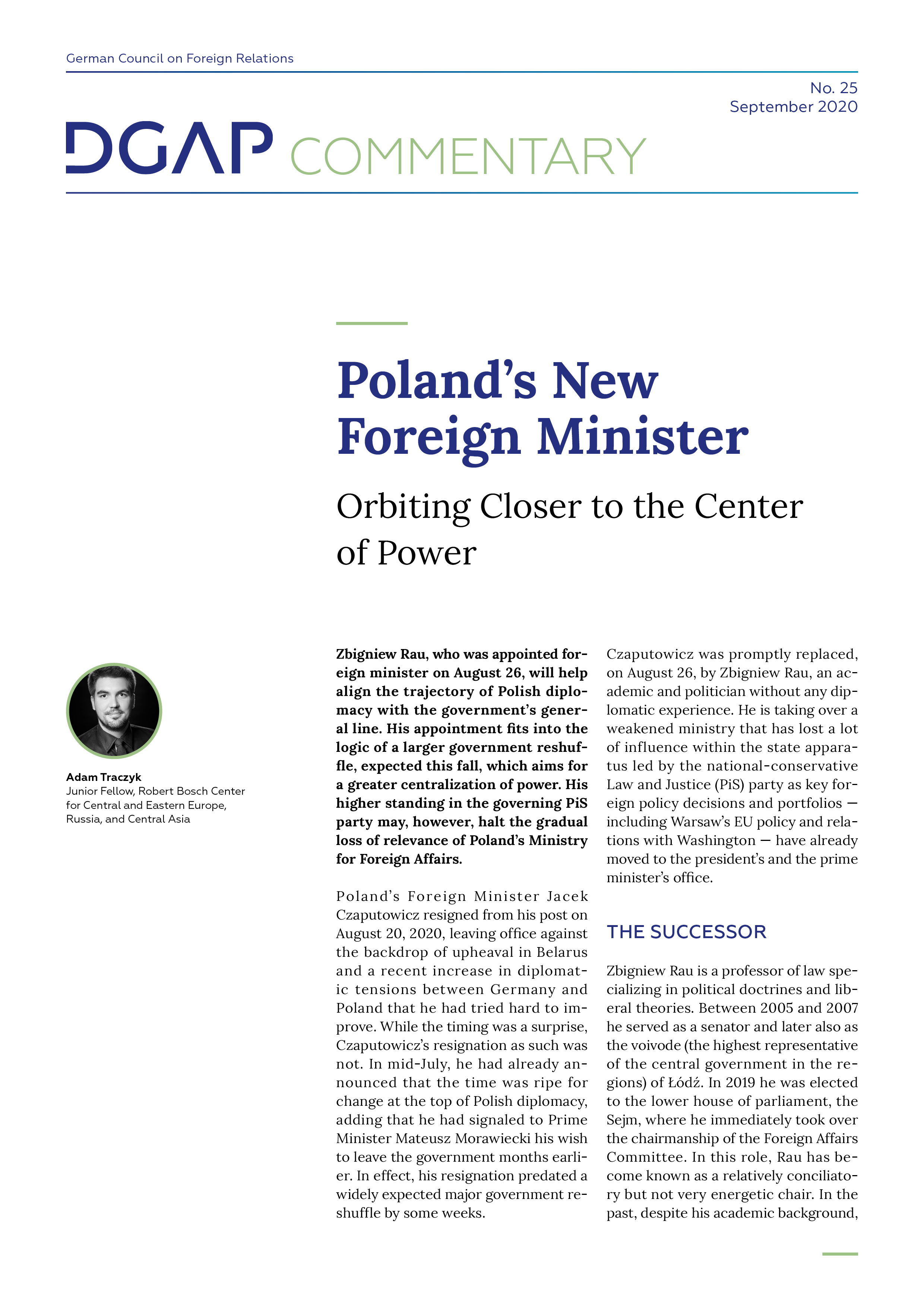Poland’s Foreign Minister Jacek Czaputowicz resigned from his post on August 20, 2020, leaving office against the backdrop of upheaval in Belarus and a recent increase in diplomatic tensions between Germany and Poland that he had tried hard to improve. While the timing was a surprise, Czaputowicz’s resignation as such was not. In mid-July, he had already announced that the time was ripe for change at the top of Polish diplomacy, adding that he had signaled to Prime Minister Mateusz Morawiecki his wish to leave the government months earlier. In effect, his resignation predated a widely expected major government reshuffle by some weeks.
Czaputowicz was promptly replaced, on August 26, by Zbigniew Rau, an academic and politician without any diplomatic experience. He is taking over a weakened ministry that has lost a lot of influence within the state apparatus led by the national-conservative Law and Justice (PiS) party as key foreign policy decisions and portfolios—including Warsaw’s EU policy and relations with Washington—have already moved to the president’s and the prime minister’s office.
THE SUCCESSOR
Zbigniew Rau is a professor of law specializing in political doctrines and liberal theories. Between 2005 and 2007 he served as a senator and later also as the voivode (the highest representative of the central government in the regions) of Łódź. In 2019 he was elected to the lower house of parliament, the Sejm, where he immediately took over the chairmanship of the Foreign Affairs Committee. In this role, Rau has become known as a relatively conciliatory but not very energetic chair. In the past, despite his academic background, he did not shy away from taking a radical stance on cultural issues consistent with the governing party’s narrative.
Although Rau is not one of the leading PiS figures, unlike Czaputowicz he has a fairly strong political position within the ruling party. This is due to his previous involvement in circles affiliated with former President Lech Kaczyński and good relations with an influential PiS figure and a close friend of the Kaczyński family, Janina Goss. PiS leader Jarosław Kaczyński himself is assumed to have selected him as a minister, preferring him to the ambitious and well-connected politicians of the younger generation—Szymon Szynkowski vel Sęk and Paweł Jabłoński, who both hold the rank of deputy foreign minister.
The newly appointed minister has been able to swiftly get to grips with his position. One day after his nomination he took part in the “Gymnich” meeting of EU’s foreign ministers in Berlin; next, he headed to Slovenia for the Bled Strategic Forum. Furthermore, only days after his nomination the Polish Ministry of Foreign Affairs (MFA) announced that it had finally granted its agrément to the designated German ambassador to Warsaw, Arndt Freytag von Loringhoven. This sensitive issue had been poisoning diplomatic relations between Germany and Poland for weeks, and Czaputowicz had been unable to solve it, despite his close, cordial personal relations with his German counterpart, Heiko Maas, and his repeated efforts to improve bilateral relations between the two countries. The agrément can be seen as a present and jump-start for Rau by Poland’s strongman Jarosław Kaczyński who, according to various sources, was stalling the procedure.
WHAT TO EXPECT
According to his own statements, Rau wants to continue “the foreign policy pursued so far along the lines set in the past months and years while coordinating the efforts between the government and the president.” Rau’s elevation seems to fit well with the thorough reshuffle of the government expected this fall. Apart from the reduction in the number of ministries, it aims to achieve greater centralization and reduce the autonomy of ministries, thus ensuring that the government is more manageable.
According to his own statements, Rau wants to continue the foreign policy of the past months and years.
This could be good news for the MFA. In recent years, ministers from the ruling coalition’s radical wing caused major problems for Polish diplomacy by taking unauthorized initiatives. The most prominent cases were the so-called “Holocaust law” and the call for Poland to withdraw from the Istanbul Convention on preventing and combating violence against women and domestic violence.
While Rau’s views are further to the right than Czaputowicz’s, it is unlikely that he will support Poland’s hardliners in meddling in foreign affairs. His loyalty is to Kaczyński and not to Poland’s radical justice minister, Zbigniew Ziobro; it is therefore highly unlikely that the new foreign minister will encourage initiatives that don’t have Kaczyński’s or Morawiecki’s blessing. At the same time, Rau, unlike Czaputowicz, will not act as a calming influence should PiS headquarters decide to take a harsher line.
A WAY OUT OF MARGINALIZATION?
When Czaputowicz was appointed two-and-a-half years ago, Poland’s de-facto leader Kaczyński described this – publicly – as an “experiment.” It turned out that the experiment not only concerned the minister himself but the whole structural architecture of the Polish foreign policy apparatus. What followed was an unprecedented marginalization of the already troubled Ministry of Foreign Affairs.
The new division of competencies limited the MFA’s room for maneuver on the diplomatic front. The key sections of Polish foreign policy are managed by the president, Andrzej Duda, and the prime minister. Since Donald Trump became US president at the beginning of 2017, Duda’s office, together with the Ministry of Defense, has been taking care of transatlantic relations and security issues. It also oversees the Three Seas Initiative, while Prime Minister Morawiecki deals with European affairs.
The Ministry of Foreign Affairs’ degradation was completed by the formal transfer of the position of secretary of state for European affairs (with Konrad Szymański as the incumbent) and the departments dealing with EU affairs from the MFA to the Chancellery of the Prime Minister, which took place after last year’s parliamentary election in November 2019. The move was approved by Czaputowicz at the time; since leaving his office he has criticized it as harming Poland’s European policy by effectively causing a communication breakdown between the two institutions.
As a result, during Czaputowicz’s tenure, the MFA was reduced to a merely administrative role and sidelined when it came to formulating foreign policy. This became highly visible during the current crisis in Belarus. During the Euromaidan protests in Ukraine back in 2014, then foreign minister, Radek Sikorski, stole the limelight as he led his German and French counterparts to Kyiv. Six years later it was Prime Minister Morawiecki who presented a five-point plan for Belarus and called for an extraordinary European Council meeting. Czaputowicz played only second fiddle.
It is unlikely that Rau will significantly change the structural position of the foreign office within the state apparatus and reclaim key competencies. Enjoying a stronger position within the PiS and given the aims of the coming government reshuffle, the MFA under his leadership might orbit closer to the center of power than it did under Czaputowicz. By doing so, it could regain at least some of the influence behind the scenes and pave the way for improving cooperation with the prime minister’s and president’s offices and streamlining the flow of information and expertise within the government. This would make the MFA a more relevant (but possibly also an even more complicated) partner for its European counterparts, including in Germany.


